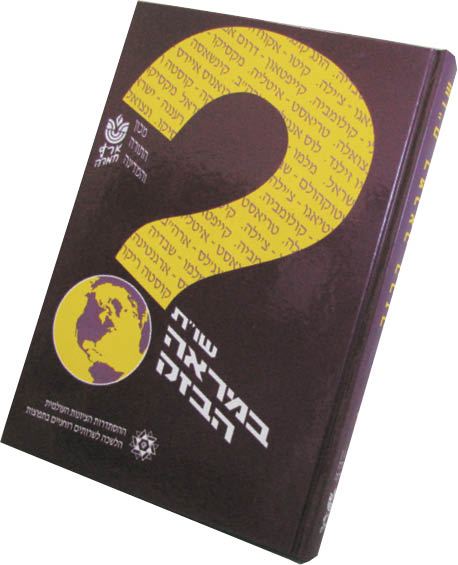
|
 Good News from Eretz Hemdah Tishrei 5778A Challenge to a Person’s Presumptive JewishnessQuestion
The son of a member of our community recently married a Jewish girl. Two weeks after the wedding we received an anonymous text message asserting that the bride is not Jewish, because her great-grandmother was not Jewish. In addition, a man came to us and stated that to the best of his knowledge the bride’s great-grandmother was not Jewish. On the other hand, a number of persons testify that they knew the bride’s grandmother as a Jew who was active in the synagogue on Shabbat and the festivals and is buried in the Jewish cemetery. Her daughter, the bride’s mother, is well known in the community and moved to Chile, where she is a member of a Conservative congregation. Note that the congregation was founded before the Holocaust by Jews who came from Romania. In the 1940's, an Orthodox rabbi came to town and conducted conversions. We do not have any conversion certificates from that era and the policy of my predecessor here was to accept these conversions. I should also note that the groom had dated number of non-Jewish girls, and his father threatened to disinherit him if he married a non-Jew. When he found a Jewish girl the father was overjoyed. So our perplexity is very great. We do not want to do anything amiss, in particular because the young man is a kohen. Please instruct us whether, on the basis of this information, she may be presumed to be a Jew. Should we relate to the statements that she is not Jewish? If so, how? AnswerA. The woman is permitted to a kohen without any hesitation1 and her Jewish status is not in doubt. B. The person challenging it should be cautioned not to cast aspersions on the couple’s status. 2 a. The only challenge that requires investigation comes from the testimony of two witnesses who come to the beit din and testify to what they heard or what they know. This was the ruling of the Maharashdam (Even Ha’ezer 236), cited as the halachah by the Pitḥei Teshuvah (E.H. 2.3). See also Otzar Haposkim ad loc. The Maharashdam writes as follows: “Even according to Rashi (Kiddushin 76b, s.v. ke-she-kara) it appears that in order to disqualify, there must be two witnesses who come and report, even if they do not do so as a full testimony, because it says, “that two witnesses stated a hint of disqualification against her’; and because it says witnesses – there are no witnesses outside a beit din." All the more so in the present case, after marriage, when one does not heed a rumor, as per the ruling of the Shulchan Aruch (E.H. 6.3), and we heed only two witnesses who testify that they have certain knowledge of the disqualification. b. Because the bride, her mother, and her grandmother are all presumptively Jewish, the challenge to the bride’s great-grandmother’s Jewishness is ipso facto without meaning. Let us clarify this. The Shulchan Aruch (Y.D. 268.10) ruled: “A non-Jewish man or woman who comes and says I was converted properly by the beit din of such-and-such a person is not accounted trustworthy to join the congregation until he brings witnesses. If we see that they conduct themselves in a Jewish way and observe all the precepts, they are presumed to be righteous converts, even though there are no witnesses who attest who performed the conversion. Nevertheless, if they wish to marry a Jew we do not allow this until they bring witnesses or immerse themselves before us, because they have been presumed to be non-Jews.” This seems to indicate that a person, who was presumed to be a non-Jew, even though now presumed to be a Jew, must bring proof of his conversion in order to marry. According to this, if two witnesses testify that the great-grandmother was a non-Jew, there would need to be proof of her conversion. But the Meiri on Yevamot (45b) believes that the requirement of an inquiry is ab initio only; but if he has married and produced children one does not disqualify his son. Rabbi A.I. Kook issued a similar halachic ruling (Responsa Ezrat Kohen 13), that we rely on the presumption in the matter of removing a woman from her husband. If so, because here we are dealing with the descendants of that great-grandmother, we must not have any doubts about their presumptive Jewishness. See also the Pitḥei teshuvah (E.H. 152.14), who quoted a responsum by the Radbaz (IV 245): “We have found that a presumption can outweigh a certainty.” And this explains even better why post factum we can rely on the presumption of Jewishness now. See also Responsa Be-Mar’eh HaBazak (II 100). 2 See Maharsha (Chiddushei Aggadot on Kiddushin 71a, s.v. ve-she-amar): “And in the present generation the majority are of doubtful [kashrut], so a person who reveals [a problem] to his fellow is merely uttering slander and taking pride in his fellow’s shame; and everyone who disqualifies is disqualified by his own blemish. One must reprove them and get them to recant, and in particular the matchmakers are known for this and should be punished for doing so.”
|

|

